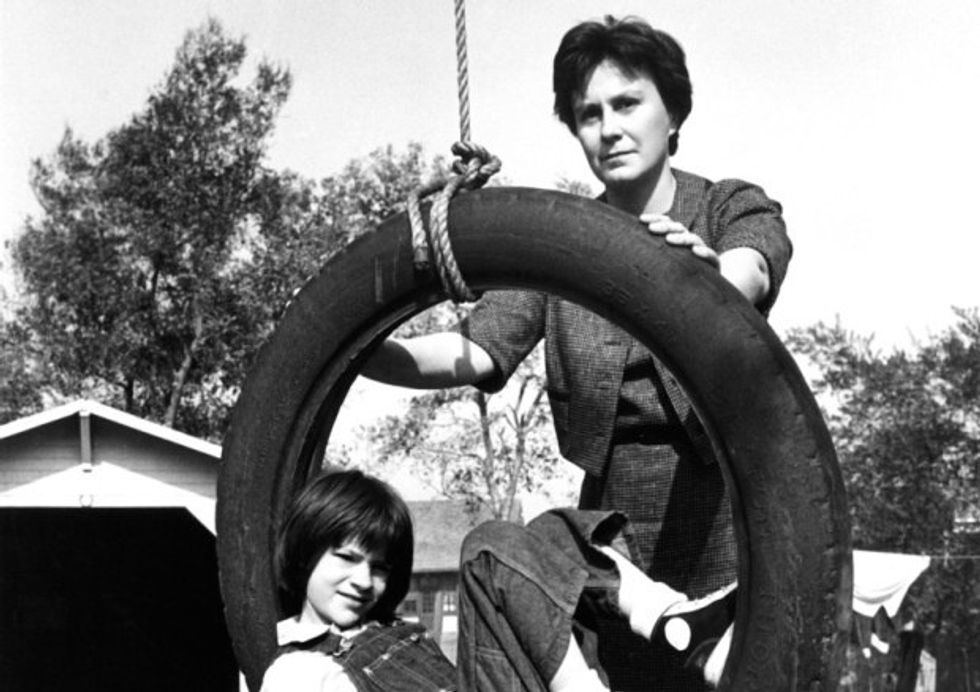Harper Lee, whose novel "To Kill a Mockingbird" explored racism and justice in a small Southern town and became a classic of American literature, passed away on Feb. 19, 2016 at the age of 89.
Nelle Harper Lee was born on April 28, 1926, in Monroeville, Alabama. This small town would become crucial in establishing her love for writing and telling stories. The town was also home to Truman Capote; the two became close, spending hours reading and making up stories. In a letter to Oprah Winfrey for her magazine in 2006, Lee wrote, “In my hometown, a remote village in the early 1930s, youngsters had little to do but read. A movie not often — movies weren’t for small children. A park for games? Not a hope. We’re talking unpaved streets here, and the Depression.”
Lee moved to New York in 1949 with dreams of pursuing a literary career. She wrote in her spare time while working as an airline reservations clerk. Eight years later, she submitted the manuscript for "Watchmen" to J.B. Lippincott & Company. After working with her editor and revising the manuscript, the novel "To Kill a Mocking Bird" emerged.
"To Kill a Mockingbird" was published in July 1960, and was met with critical and commercial success. The book won the Pulitzer Prize for Fiction in 1961 and was optioned for a movie.
Although Lee never expected the success she received, her novel became a classic in American literature, impacting country's conscience and character. A 1991 survey by the Book of the Month Club found "Mockingbird" ranked second only to the Bible in terms of “making a difference in people’s lives.” Harper Lee's novel profoundly impacted American literature, like few other books had before.
Lee constructed a book that became a moral compass; the novel tests the ethical being of the reader. She added an ethical dialogue to American literature. When readers encounter Atticus Finch, they must ask themselves if they would have the moral convictions that he possesses. Lee's novel prompts readers to ask if both we as individuals and a society can possess the same type of transformative power to represent what can be in the face of what is. The novel expands the readers understanding of what it means to be a good and decent human being. This moral stance and the questioning of the reader if they could follow such an example is a great contribution to American literature.
In addition, Lee developed a book that effectively confronted discrimination and prejudice. "To Kill a Mockingbird" gave an accurate depiction of life in the South. It dared to speak the truth about the immorality of Southern society. The novel demonstrates how fear and ignorance can corrupt communities, and how easily an individual's morality can disappear under the pressure of mob mentality. As author Hannah Kent states, "It presents racism, violence, and prejudice as not inevitable or inherent, but the natural consequence of fear, insecurity and selfishness, and courage as the willingness to remain kind and merciful when you would be persecuted for it."
"To Kill a Mockingbird" has become a staple on high school reading lists throughout the country, and remains excellent illustration of empathy and compassion. In addition to winning the Pulitzer Prize, Lee was honored by President George W. Bush in 2007 with the Presidential Medal of Freedom and by Obama in 2010 with the National Medal of Arts for her contributions to literature.
While awarding Lee the presidential medal in 2007, President Bush said, “One reason "To Kill a Mockingbird" succeeded is the wise and kind heart of the author, which comes through on every page. This daughter of Monroeville, Alabama, had something to say about honor, and tolerance, and, most of all, love — and it still resonates. "To Kill a Mockingbird" has influenced the character of our country for the better. It’s been a gift to the entire world.”
























